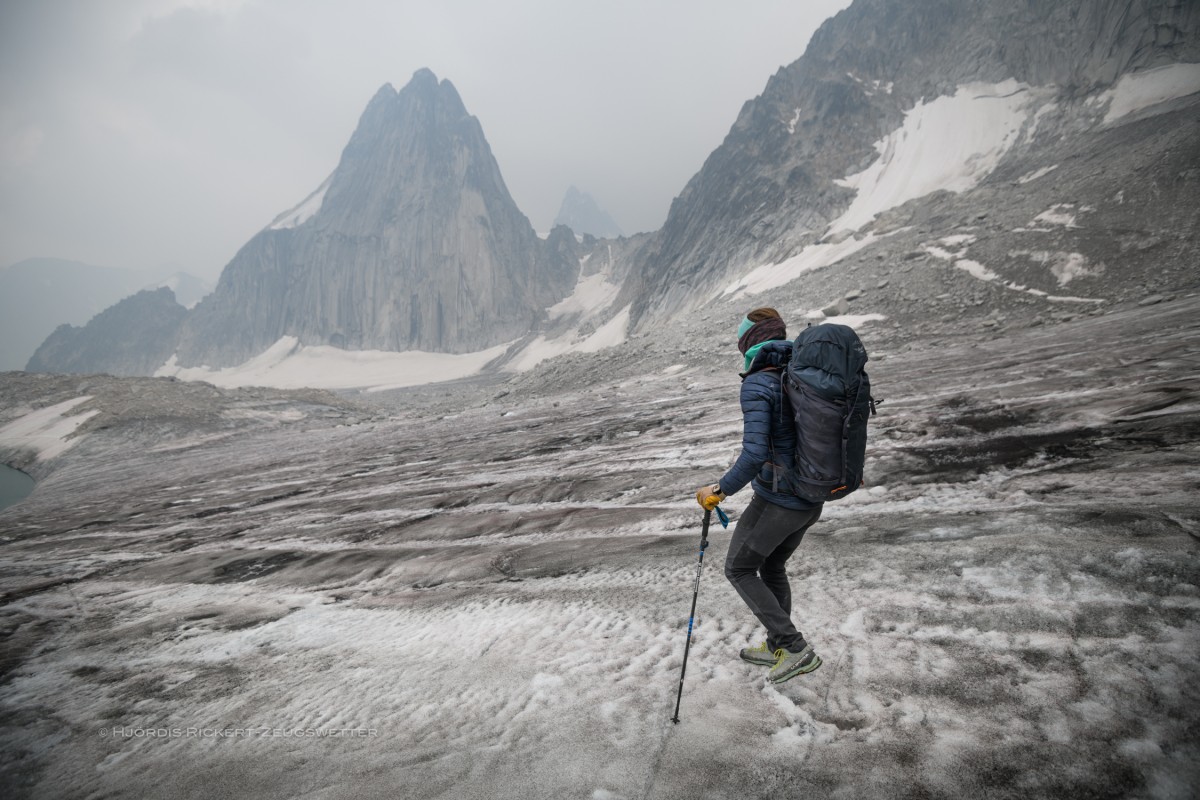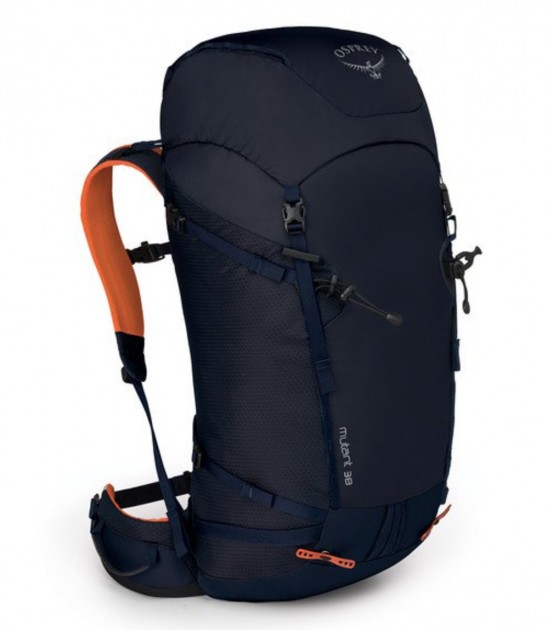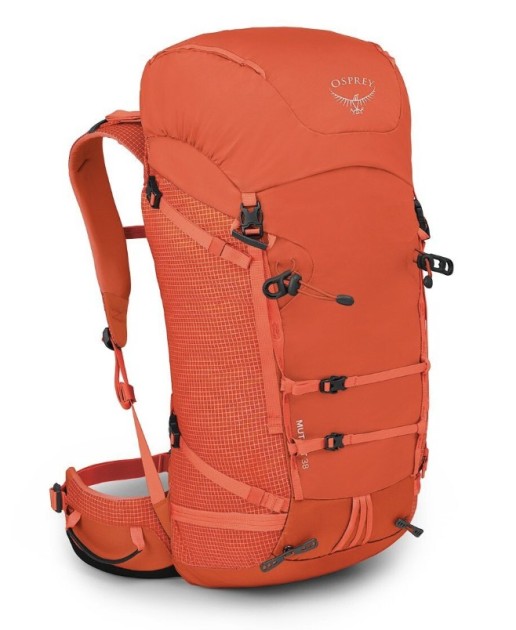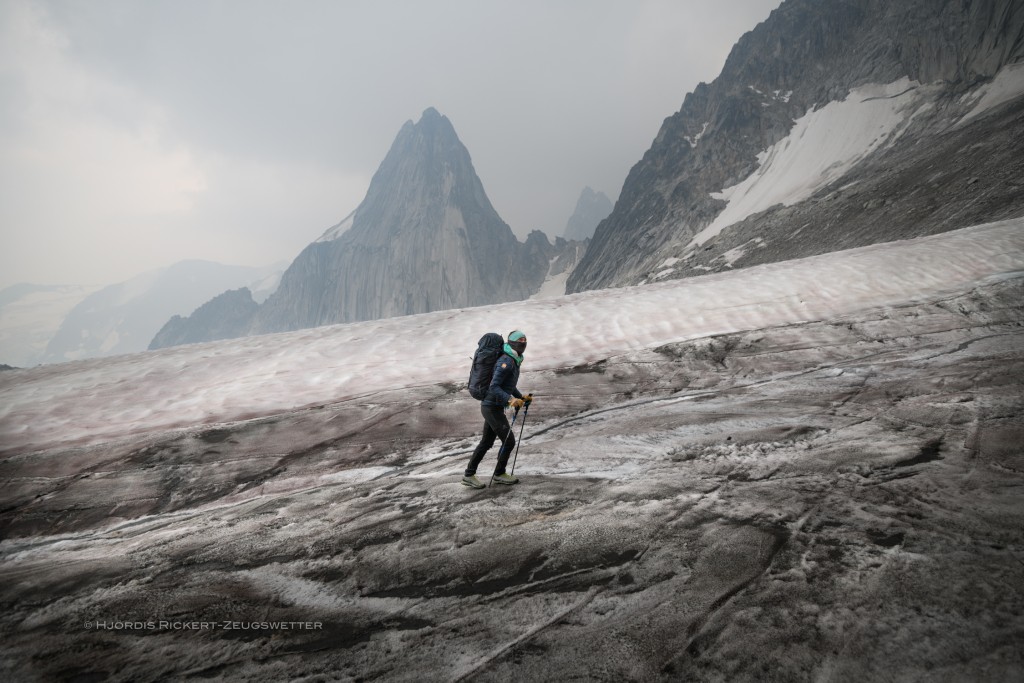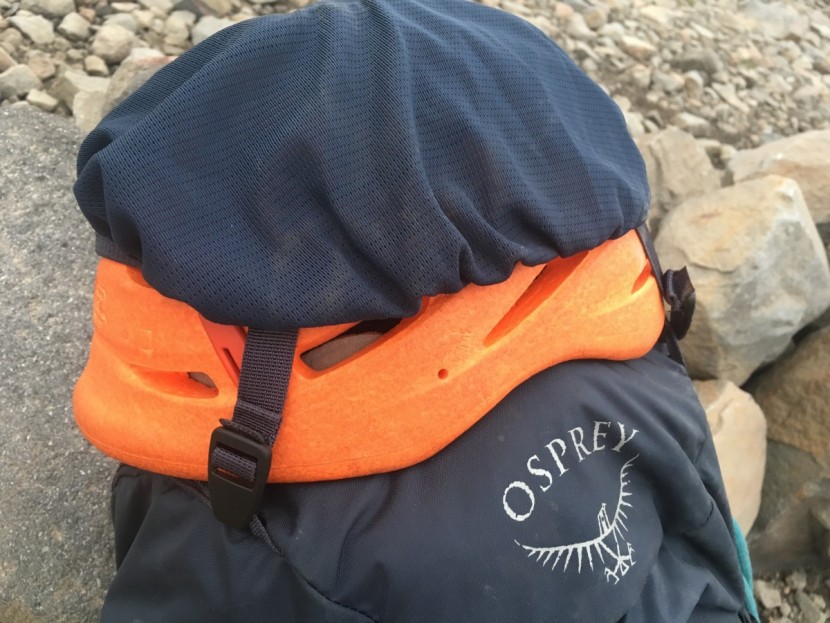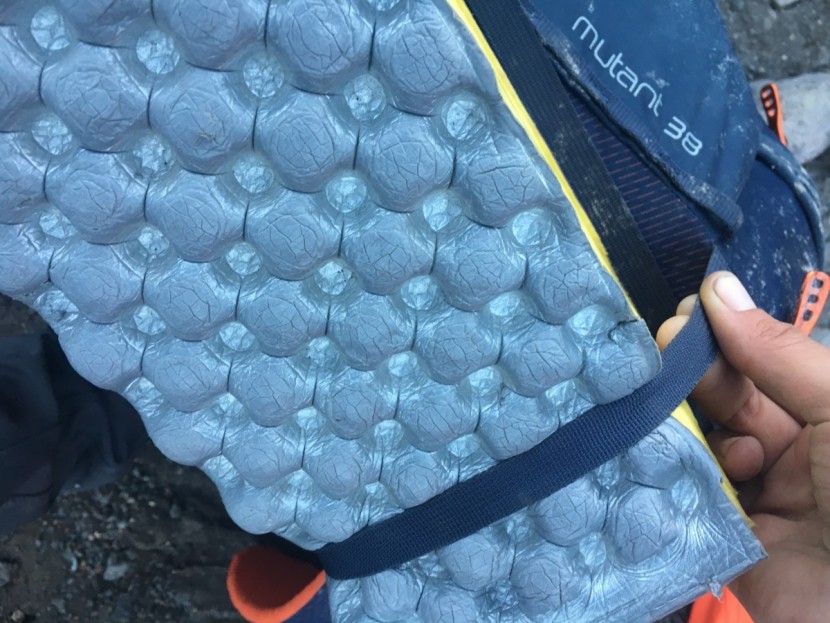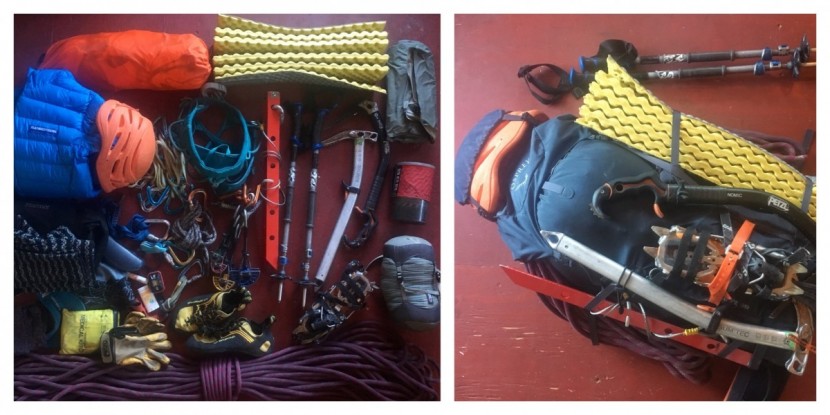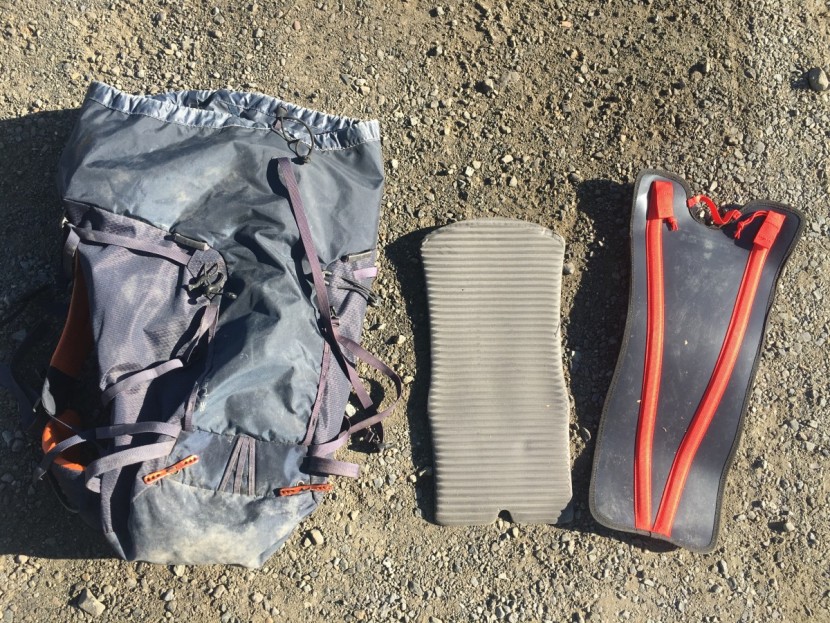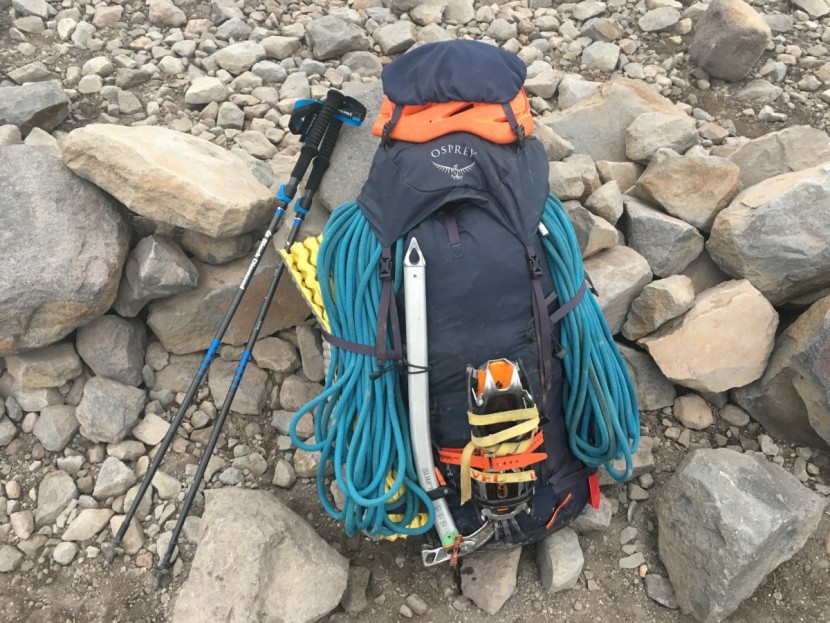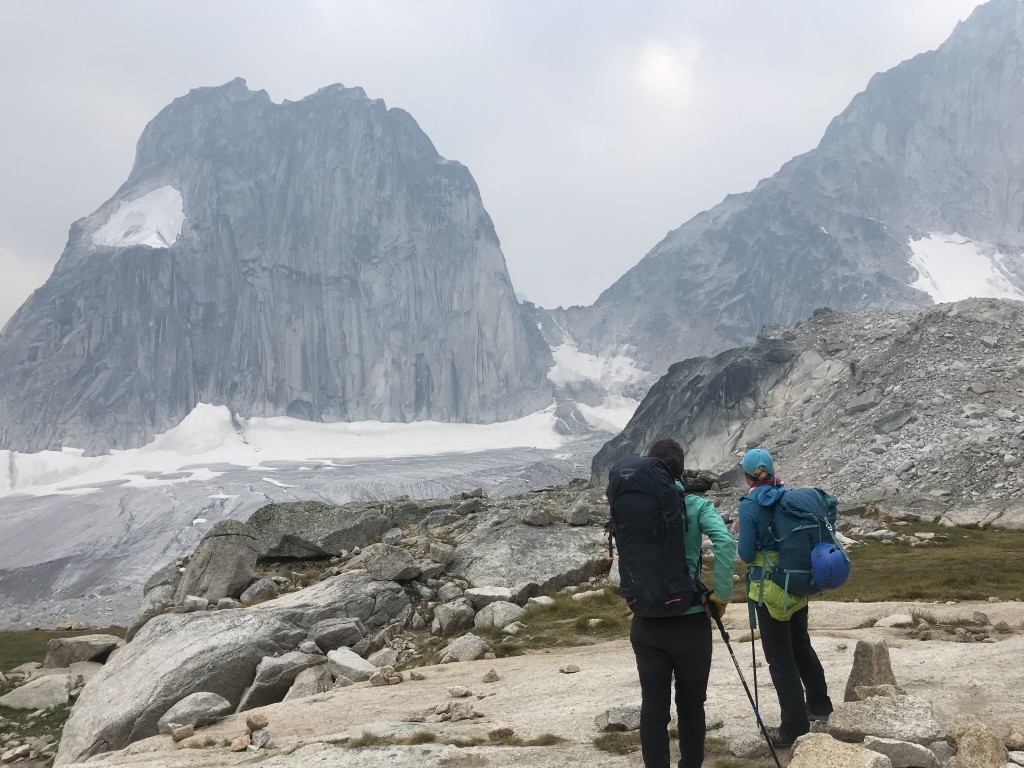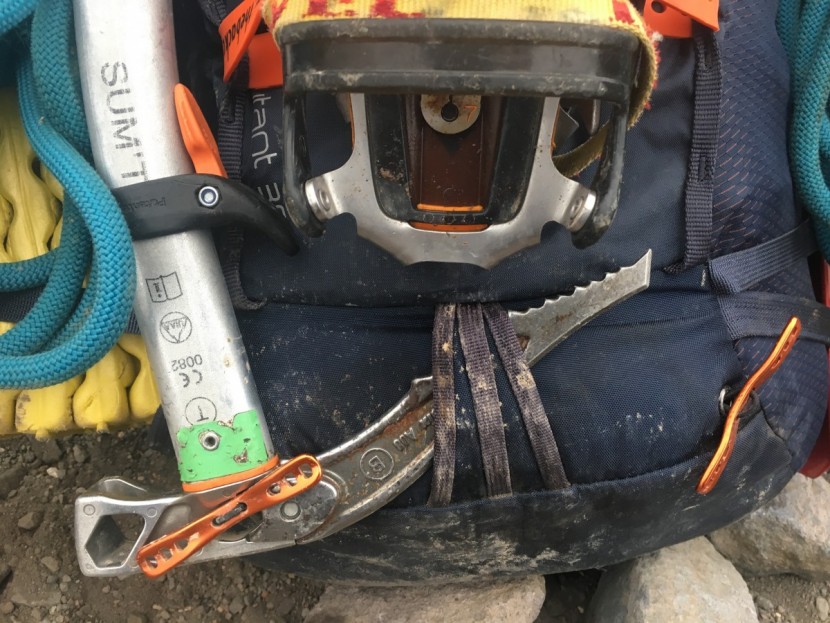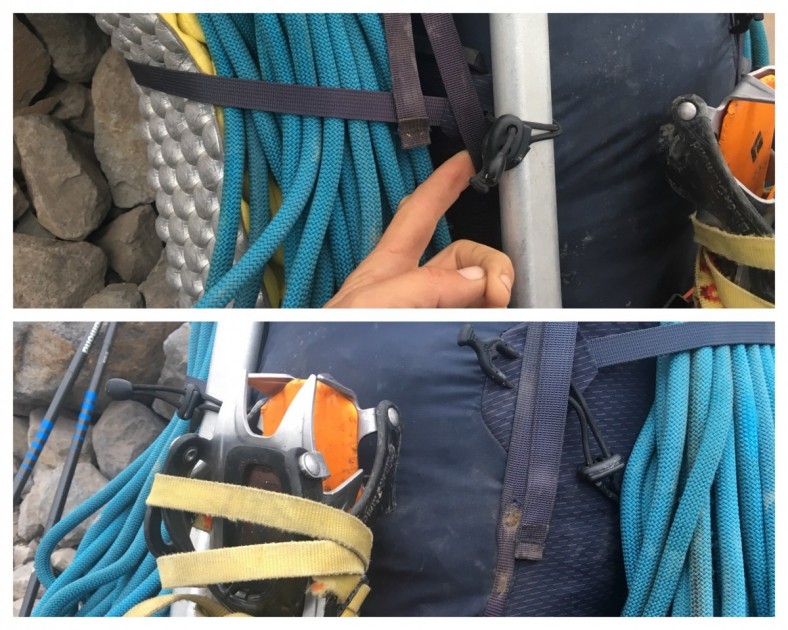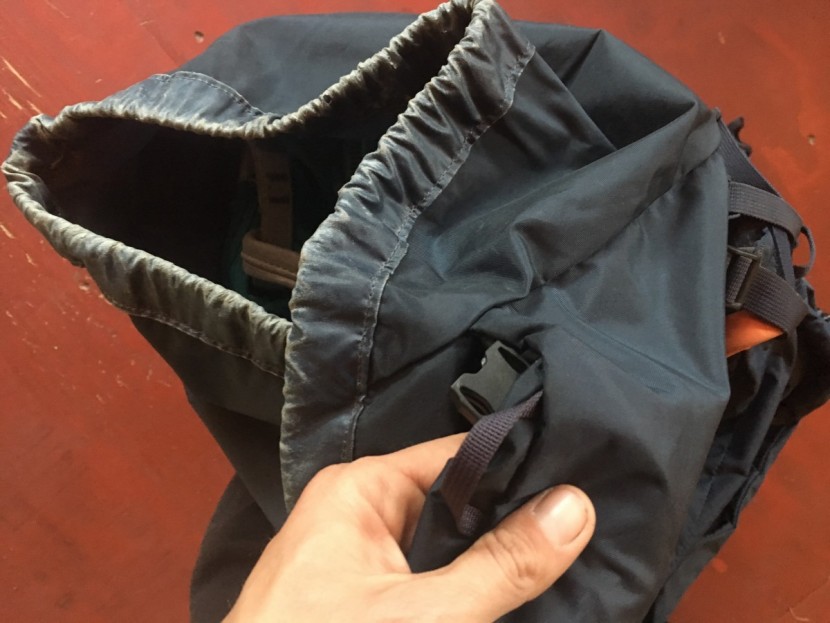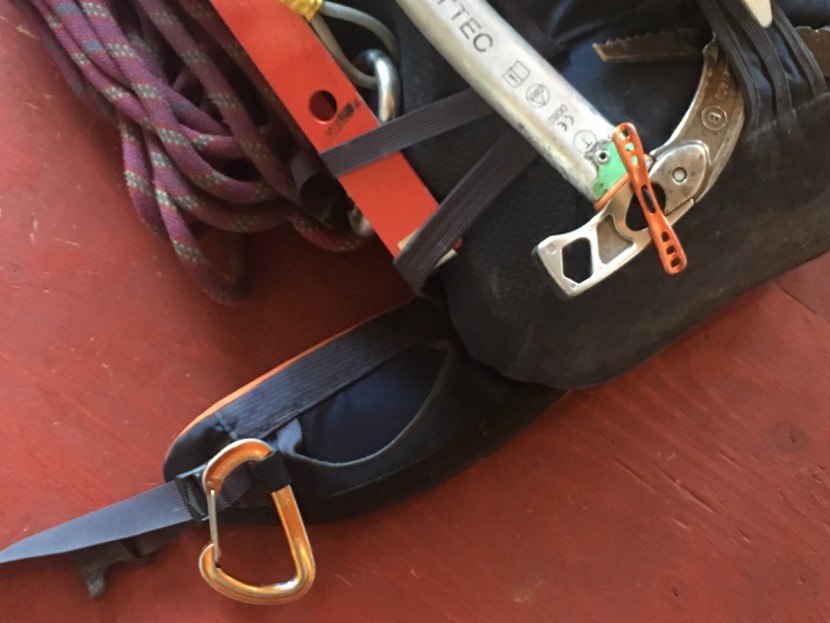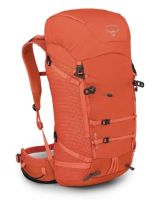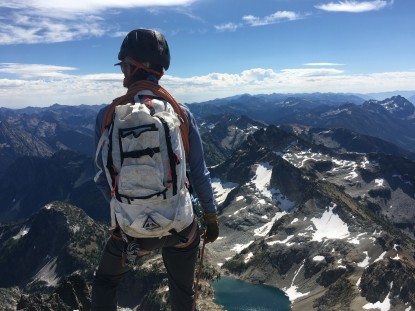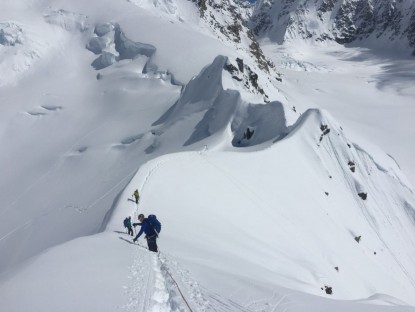If you're certain you need the extra 14 liters of capacity, check out this pack's bigger cousin, the Osprey Mutant 52, an excellent addition to the Mutant series and one of our favorite packs in the 50-liter range. Our review of mountaineering backpacks shows how it stacks up versus competing products.
Editor's Note: This review was updated on October 27, 2022 with info on updates to Osprey's Mutant line of packs.
Our Verdict
Our Analysis and Test Results
Osprey revamped their Mutant pack line with recycled NanoFly fabric, removable webbing gear attachment straps, and more eco-focused, PFAS free durable water repellent coating. Above, the photos depict the model we tested (left) alongside the updated Mutant 38 (right). We're linking to the updated model in this review.
The Mutant 38 is a great backpack that gets top marks in all categories, coming out as the Editors' Choice Award in Mountaineering Packs for another year.
Versatility
First, a disclaimer: many of our testers came into this review with a strong bias against Osprey packs for mountaineering and climbing purposes. Typically, we find them to be over-engineered, over-featured, busy, and way too strappy. One of our reviewers sold an old Osprey alpine pack many years ago after getting off a windy alpine climb and having one of the many straps flogging them in the face for hours on end. Enough!
In our first year reviewing the Mutant, it blew us away — this time metaphorically and without straps flogging us in the face. We overloaded the pack with 4-5 days worth of alpine climbing gear and food (and we eat really, really well when we're in the mountains). The pack carries impressively well, even when crammed with 50 pounds of gear for the approach to an alpine basecamp, making it a very versatile pack.
Osprey also made the helmet carry removable instead of sewn into the lid so you can carry your helmet on the front of the pack when you're leaving the lid behind. It clips easily onto the front daisy chain loops.
Osprey now also makes two more sizes of Mutant packs, a 22 liter and a 52-liter size. We tested the 52 as well, and while it is not quite as versatile as the 38, it is an excellent addition to the series for those who prefer longer, bigger, or more complex objectives and need just a little more pack capacity.
Weight to Volume Ratio
The Mutant doesn't top the charts in our grams per liter measurement, but it still reigns as our Editors' Choice winner due to well-balanced performance across many categories.
It is important to note that we did not include the lid in the grams per liter calculation for this pack. Adding it in creates an unnecessary penalty in a competitive field where many other packs don't feature lids at all. The Mutant has a removable lid and a unique FlapJacket, which can cover the top of the pack even when the lid is left behind. No other pack with a removable lid functions similarly with the lid removed. Traditional pack designs expose your gear to the elements via that little hole where the pack cinches closed at the top of the main compartment. What's more, in an inspired design update, the Mutant's helmet carry flap is now removable as well, so you can still use it on the front of the pack if you leave the lid behind.
Ultimately, a modern pack's weight is all about thoughtful design. A good mountaineering backpack should eliminate redundancies and excess materials without compromising utility. Osprey designed a brilliant pack in this regard across all of these categories.
Comfort
The first version of this pack carried like a dream. We routinely loaded it up with food and climbing gear for 3-4 day mountaineering trips. We were stunned by its comfort on everything from long trail slogs to steep technical rock and ice climbs.
That model featured a single metal stay in the middle of the back panel. For the current model, Osprey essentially split the stay in half, using two narrower versions on either side of the back panel and angling them in a V shape. The pack carries differently due to this, but it's still very comfortable. This shift works with the pack's slimmed-down profile to climb even better than before.
The other thing we love about this pack is that you can remove the framesheet and its stays, but you can leave the foam back panel in place. This lets you slim down for the summit push. We really like having foam in the back panel because climbing gear is often hard, awkwardly shaped, and pokes you in the back if there isn't any structure. The foam can also be removed if you really want to leave it behind or use it as part of your sleeping system. It is a little finicky to put back into place but totally doable. It doesn't give the pack much structure, however, so we only stripped it down if we were carrying very lightweight and puffy items like jackets — making it great for long ice climbs when the heavy gear is on your harness.
The shape of the pack is slim and feels svelte on the back. The top is wide and often gives the pack a triangular shape. This makes it easy to squeeze in those last puffy, soft clothing items at the top of the pack and helps the whole thing carry nimbly on the hips. The Mutant allowed us to rotate and move our hips better on the climb and the approach, which is critical for improved hiking mechanics, efficiency, and therefore endurance. This is a pack that you'll love on those 20 hour days in the mountains.
Another key to hip freedom is the narrow hip belt. The stiff padding is adequate and provides enough support for heavier loads, but the narrow webbing keeps the hip belt out of your way when you have a harness on underneath it. The Mutant has useful gear loops on the padded portion of the hip belt, which blocks your rear gear loops, but the thinner webbing up front allows improved climbing movement and access to your front gear loops.
The Mutant revolutionized our expectations for climbing pack comfort. Our physical therapist helped explain exactly what is going on here. Historically, backpacks have had relatively rigid frames and aggressive lumbar support. What climbers have started to learn is that this forces your spine into extension and pushes your butt out. While this might feel better to someone who rarely carries a backpack because it puts more strain on your skeleton and less on your muscles, for those who often venture into the mountains with a high level of fitness and balanced strength, this restricts motion and ultimately reduces endurance. Climbing packs are increasingly minimalistic, with flatter, softer back panels. Osprey has figured out a way to blend both options better than any other climbing pack we have tried.
For a complete discussion on carrying comfort, check out our buying advice article, complete with advice from a long-time mountaineer and physical therapist in the Pacific Northwest.
Another important aspect of comfort in this category is breathability. Breathable fabrics are essential for a versatile pack you can use year-round. The Mutant excels in this realm as well, with highly breathable materials and a ribbed texture in the foam back panel. Some pack manufacturers have tried to resolve this breathability issue by suspending the back panel away from the back and putting a tensioned mesh panel. However, this puts the load further away from your back, which compromises comfort and balance for climbing and scrambling. The Mutant keeps the weight close and still manages to wick moisture and keep you cranking uphill.
Last, the shoulder straps are a firm but thin foam. Some may question the comfort, but we swear by it. The firmness ensures improved movement — the pack stays with you for those technical moves. It also effectively distributes the load over the width of the strap. Fluffy, soft padding just gets compressed under heavy loads and only feels comfortable when you try it on in the store. With a few changes to this year's model, we still rate the Mutant 38 at the top of the Comfort metric.
Durability
Lightweight fabrics are not known to be durable. Typically, there is a tradeoff between lighter weight and durability. As climbers, we weigh our priorities (pun intended) for one over the other.
Osprey uses 210 denier nylon for most of this pack, a very common linear mass density of fibers used in mountaineering packs. In contrast, expedition packs may use 420 denier fabric. With this update, Osprey added 420 denier nylon packcloth to the bottom to help the pack stand up to repeated drops on rocks, improving its durability.
Features
Osprey further refined the features on the updated Mutant, and, overall, we really appreciate the changes. There are two, however, that we were not thrilled with — the loss of the internal mesh pocket and the new front attachment point for the rope attachment strap.
We appreciate the irony of our previous criticism of Osprey packs for having too many features and our complaint that they eliminated a pocket. But that internal mesh zippered pocket was great for the days you left the top lid behind. Now, it is easier to lose small items like chapstick, headlamps, and snacks when you ditch the lid.
The rope carrying strap is an excellent addition, but they anchored it to the front of the pack, and if you don't clip it in, it just dangles on the outside of the pack and gets in the way of ice tools, crampons, etc. This is a flashback to our objections to Osprey packs with their history of strappy, flappy designs.
Another minor flaw is that the points where you secure the shaft of your ice axe or tools overlap with the buckles that close the pack, which is often inconvenient.
There are other updates, however, that we really like. One is the switch to the simple dual side strap design (instead of the complicated z strap system with four side straps to contend with). This is tried and true in climbing packs, and we dig it.
And we love that removable FlapJacket cover and helmet carry pocket. You can now carry a helmet on top of the lid, which we love for ergonomics and helmet protection (so you don't crack it when you set your pack down), or on the front of the pack. We don't like the front carry as much due to the possibility of setting your pack down on the helmet and damaging it. It also adds weight to the outside of the pack, pulling the center of gravity away from your back (unless you have an ultralight helmet, which we recommend). However, this does allow an external helmet carry if you want to leave the lid behind. Excellent attention to detail.
The hip belt design is fantastic. It has a small buckle and a very low profile, which allows excellent range of motion for the hips, more than we have ever experienced in a mountaineering pack. It's also improved performance and comfort when wearing a harness. The gear loops are convenient, as is the ice clipper attachment sleeve. The hip belt design is a very smart blend of features for excellent support on long approaches with heavy loads, minimal interference with your climbing movement on technical pitches, and easy access to your gear on the climb.
And while there is no formal crampon attachment, those same daisy chain loops designed to allow a front helmet carry also provided anchor points for a trusty ski strap. We often threaded a ski strap and attached our crampons to the front of the pack. Otherwise, you can put them carefully inside the pack.
Overall, the fleet of features on this pack is excellent and highly practical for the technical alpinist or general mountaineer.
Thank you, Osprey. This pack is still a game-changer.
Value
The Mutant is priced more like a 30-something liter pack, but in our field tests, we found it useful on trips we would typically think to bring a 50-liter pack. This expands the utility from days at the crag to 4-5 day mountaineering trips, greatly reducing our quiver of climbing packs. With limited storage space, we're psyched on that.
Conclusion
The Mutant 38 has been popular among many of our colleagues. As professional mountain guides, we use and abuse a lot of gear. Several guides have kept their Mutant packs through multiple seasons, an impressive feat for the number of days we spend in the field. During our first round of testing, we got out on a training climb with a now-IFMGA certified guide who was preparing for her last exam. She had been using the Mutant and loved it. We climbed the North Ridge of Mt. Baker in a day at the end of the summer, in icy and challenging conditions. She mock guided two of us up 7,000 feet of steep, largely technical, late-season glaciated terrain. We carefully observed all of her systems, from rope techniques to the gear she chose. It was an inspiring and athletic ascent. The Mutant was up to the task.
| Awards | Best Overall Mountaineering and Alpine Model |
|---|---|
| Price | $210 List Check Price at Backcountry |
Overall Score  |
|
| Star Rating | |
| Bottom Line | This is an excellent pack for most mountaineering uses, excelling in comfort and versatility in all alpine terrain |
| Pros | Comfortable, affordable, durable, fully featured |
| Cons | Not as lightweight as some packs |
| Rating Categories | Osprey Mutant 38 |
| Versatility (30%) | |
| Weight to Volume Ratio (20%) | |
| Comfort (20%) | |
| Durability (15%) | |
| Features (15%) | |
| Specifications | Osprey Mutant 38 |
| Measured Volume (liters) | 37 |
| Measured Weight (pounds) | 2.84 (without lid), 3.25 (with lid) |
| Measured Weight (grams) | 1288.2 |
| Weight to Volume Ratio (grams per liter) | 34.82 |
| Frame Type | Inner framesheet with aluminum stays |
| Fabric | 210D nylon with 420HD nylon packcloth on bottom |
| Pockets | 1 zippered lid |
| Hip Belt? | Yes - reverse wrap hybrid EVA foam w/ gear loops and ice clipper holsters |
| Removable Suspension Padding? | Removable framesheet and/or dual stays |
| Lid? | Yes - removable with stowable FlapJacket for lidless use |
| Hydration System Compatible? | Yes - internal pouch with buckled hanging loop |


